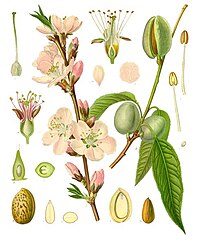
Photo from wikipedia
Green peach aphid [Myzus persicae (Sulzer) (Hemiptera: Aphididae)] is a significant pest with a known history of insecticide resistance. Neonicotinoids could manage this pest; however, their frequent use led to… Click to show full abstract
Green peach aphid [Myzus persicae (Sulzer) (Hemiptera: Aphididae)] is a significant pest with a known history of insecticide resistance. Neonicotinoids could manage this pest; however, their frequent use led to the evolution of resistance in field populations of M. persicae. Toxicity data for neonicotinoid insecticides synergized with pipernyl butoxide (PBO) in a field population (FP) were collected and compared to a laboratory susceptible clone (SC) of aphids. The enhanced expression of metabolic resistance-related cytochrome P450 gene CYP6CY3 and an arginine-threonine substitution were detected in FP, causing a single point mutation (R81T) at β1 subunit of nicotinic acetylcholine receptor (nAChR) within D loop. High level of resistance to imidacloprid was developed in FP with 101-fold resistance ratio and moderate resistance level (10.9-fold) to acetamiprid. The results of PBO synergized bioassay suggested that cytochrome P450 enzymes were involved in the resistance to neonicotinoids. The mRNA transcriptional level of CYP6CY3 gene was significantly higher (3.74 fold) in FP compared to SC. The R81T mutation associated with neonicotinoid resistance had 26% resistant allele frequency in FP. Both P450 enzymes and R81T mutation of nAChR were found in field-evolved neonicotinoid resistance. It is concluded that field-evolved resistance in green peach aphid could be managed by using appropriate synergists such as PBO.
Journal Title: PloS one
Year Published: 2022
Link to full text (if available)
Share on Social Media: Sign Up to like & get
recommendations!